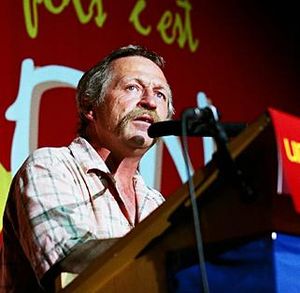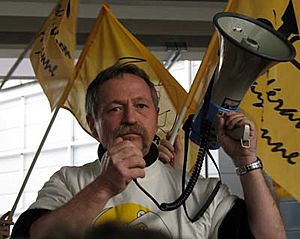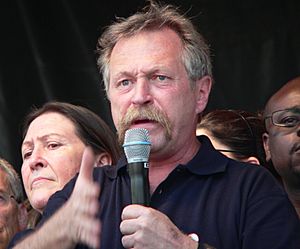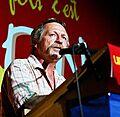José Bové facts for kids
Quick facts for kids
José Bové
|
|
|---|---|
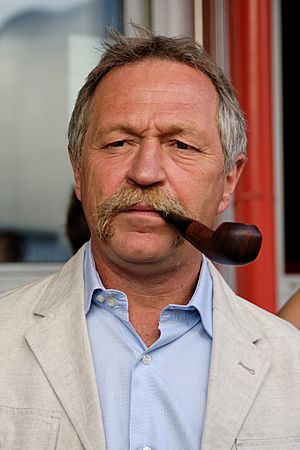
Bové in 2009
|
|
| Personal details | |
| Born |
Joseph Bové
11 June 1953 Talence, France |
| Alma mater | Bordeaux Montaigne University |
| Occupation | Farmer, politician, syndicalist |
Joseph "José" Bové, born on June 11, 1953, is a well-known French farmer and activist. He is famous for speaking up for farmers' rights and for his work against unfair global trade rules. He was a spokesperson for a group called Via Campesina, which supports small farmers worldwide. José Bové also ran for president in France in 2007. Later, he served as a politician in the European Parliament from 2009 to 2019.
Contents
José Bové's Early Life
José Bové was born in a town called Talence, near Bordeaux, France. His family moved around a lot when he was young. He even lived in the United States for a while, in Berkeley, California, because his parents were researchers there. Living in the US helped him learn to speak English very well.
After returning to France, his family settled in Paris. When he was older, José Bové decided not to join the army. Instead, he went to live in the mountains and worked as a shepherd. This experience helped shape his future as a farmer and activist.
Standing Up for Farmers and Land
In 1976, José Bové joined a big protest movement called the Fight for the Larzac. This movement was against a plan to make a military camp much bigger on the Larzac plateau. The expansion would have forced many sheep farmers to leave their homes and changed the natural environment.
José Bové joined other farmers in occupying the land and even helped build a sheep barn illegally to show their protest. Their efforts worked, and the government eventually stopped the military plan. Because of this experience, José Bové decided to become a sheep farmer in that area, making famous Roquefort cheese.
Forming a Farmers' Union
José Bové continued to be both a farmer and an activist. In 1987, he helped start a farmers' union called the Confédération Paysanne. This union works to improve the lives of farmers and protect the environment. They support organic farming and disagree with many large companies that focus only on making money from agriculture.
José Bové is also a strong opponent of genetically modified organisms (GMOs). These are plants or animals whose genes have been changed in a lab. He believes they can be harmful to nature and people. In 1995, he even joined the environmental group Greenpeace on their ship, the Rainbow Warrior, to protest nuclear weapons testing.
Protesting Fast Food and Trade Rules
In 1999, José Bové and the Confédération Paysanne became famous around the world. They took apart a McDonald's restaurant that was being built in a town called Millau, France. José Bové said this protest was against new rules from the United States that made it harder to sell French products like Roquefort cheese. These rules were hurting French farmers.
He also wanted to raise awareness about how McDonald's used beef treated with hormones. José Bové was sent to prison for three months because of this protest, but he was released early. Later, the European Union also put rules against importing hormone-treated beef. However, the World Trade Organization (WTO) disagreed with these rules. When the EU didn't change its rules, the US put extra taxes on some European goods, including Roquefort cheese.
Fighting for Fair Global Rules
José Bové has been a key figure in movements that question how globalization works. Globalization is about how countries and economies become more connected. He believes that global trade rules should be fair and democratic, not just for the benefit of big corporations.
He has participated in many protests against unfair global trade. For example, in 1999, the same year he protested McDonald's, he joined protests in Seattle against a World Trade Organization meeting. He became a symbol for people who wanted a more just and balanced global system.
José Bové has said he doesn't oppose global rules or organizations like the WTO completely. Instead, he wants these rules to be made in a more open and fair way, with everyone having a say. He helped start a group called ATTAC, which works for financial fairness and democratic control over global trade. In 2001, he also took part in actions to destroy genetically modified crops in Brazil.
José Bové's Political Journey
In 2007, many of José Bové's supporters asked him to run for president of France. He agreed and officially announced his candidacy in February 2007. He said he was fighting for "the people that have no voice." He wanted to unite different groups on the left side of politics and challenge the right-wing parties. Famous actress Juliette Binoche supported his campaign.
José Bové was one of 12 candidates on the ballot. In the first round of the election, he received about 1.32% of the votes. After the presidential election, José Bové became more involved with Europe Écologie, a group of French environmental political parties.
In the 2009 European Parliament election, he led the list of candidates for the South-West area of France. On June 7, 2009, he was elected to the European Parliament. He was re-elected in the 2014 European Parliament election, serving until 2019. In this role, he continued to advocate for farmers, environmental protection, and fair trade policies across Europe.
Images for kids
See also
 In Spanish: José Bové para niños
In Spanish: José Bové para niños
- List of peace activists
- Marie Bové
- Elizabeth Mpofu
- Guy Kastler


